When it comes to wearable and e-textile projects, there's a lot of planning that goes into the design. First you need to be able to fit all of the hardware into your project, and then it needs to be laid out in a way that the traces of conductive thread don’t touch. SparkFun has come up with a lot of tips and tricks to help make your e-textiles projects easier (Just check out this tutorial), but this time I wanted to cover my electronics in my projects and make it look classy.
I love origami; I always have. But when it comes to fabric and making your own clothes, I’m less talented. I have always wanted to make my own clothing, but it seemed like a large task that I didn’t have the right skills for. I can sew on a patch, and hem pants and such, but I never felt like my talents were in fabric until I stumbled upon fabric origami.
It sounds weird, and it is. But it slowly opened up a door that I felt like I was capable of doing. I love sewable electronics, and I have so many project that I would like to use them in but again, I always felt like they weren’t going to look as cool as I wanted. So I did a bunch of research on fabric origami, pleating and smocking. A ton of these things are way more complicated than I think I could do, but a lot of them were quite simple, and looked really cool.
I did a bunch of testing with different designs and fabrics and integrating sewable electronics into them, and the result was actually really cool. Here is an ElectriCute video on three t-shirt hacks I made.
In the video I explain pleating and smocking some, but they are very simple concepts: A pleat is a fold made of fabric secured in place, and smocking is a way of putting lots of pleats together in a cool design (both things are pretty common, but I wasn’t very familiar with them beforehand). "Fabric origami" is basically just a fancy term for a small section of cool, folded-looking smocking. That being said, I like calling it fabric origami because it makes me feel cool. The three projects I make each have a different design: a diamond design (which I turned into a square) for the Space Invader project:
My square "fabric origami"
a lozenge design for the Sound Sensor project:
My lozenge "fabric origami"
and a lattice design for the Xbee Buzzer project:
My lattice "fabric origami" (this one is my favorite)
You can find the sewing guides, hardware layout and code I used for these projects on this GitHub repo. I could sew each of these designs with conductive thread, but I found it much easier to sew with regular thread and then only use conductive thread on the parts that needed them. This reduced the amount of conductive thread used, and also made the layout easier. Each design pulls back fabric that can be used to secure electronics without the conductive thread being visible from the front. Sounds kinda complicated, but it is actually really easy. Basically, you sew the fabric origami (or smocking design, if you want to be dull), and then sew on your electronics through the extra fabric on the back. Simple as that – make a straight path to power, don’t cross anything, and you have an awesome looking project.
I wanted to include some other designs I found in my searches that were also really cool, but just didn’t work for my projects:
From http://debbieshore.blogspot.com/2013/08/these-are-some-of-designs-from-smocking.html
From http://www.foldability.co.uk/blog/
From http://www.babeeni.com/News-do-you-know-different-types-of-smocked-dresses-for-girls-part-2-749.aspx
From https://mypatchwork.wordpress.com/2014/07/26/41-fabric-manipulation-tutorials/
From http://purestform.tumblr.com/post/29425839868/folding-fabric-at-the-fashion-institute-of-the
I have no idea how these next examples were made, but DON’T THEY LOOK AWESOME?!?
From https://academy.burdastyle.com
From http://www.farfetch.com/uk/shopping/item11043306.aspx?ffref=pp_recom
From http://rhondabuss.blogspot.com/2015/01/monday-morning-inspiration.html
From https://ruthsinger.com/
Anyway, I hope this inspired some project ideas. I would love to hear about and see any fancy wearable projects that you've made!
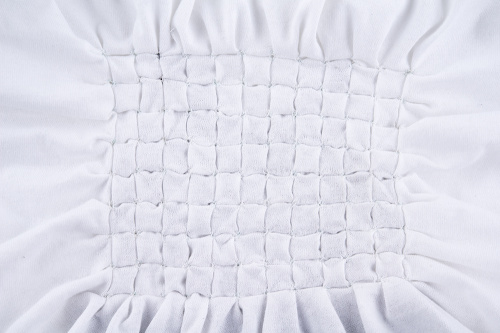
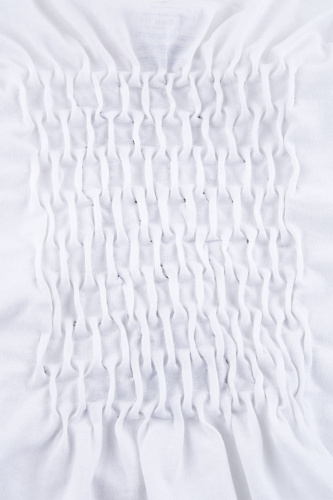
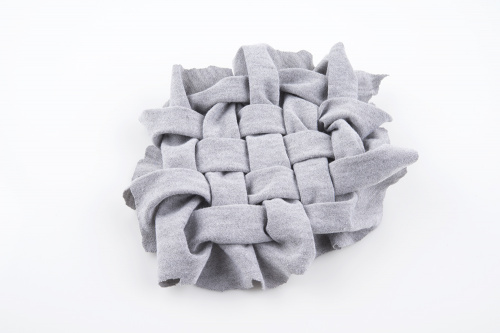
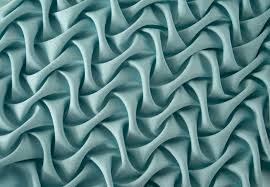

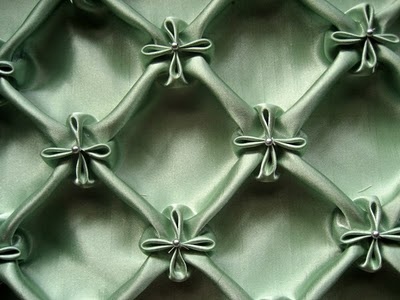
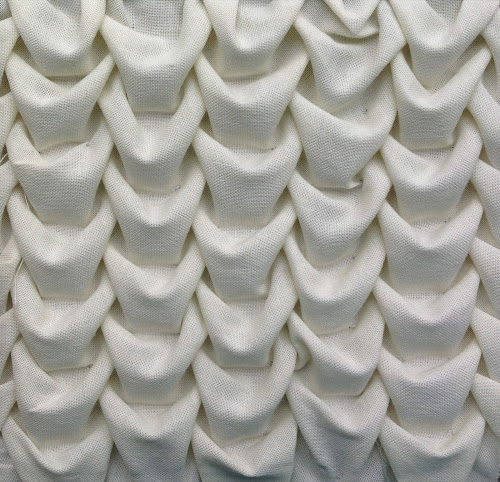
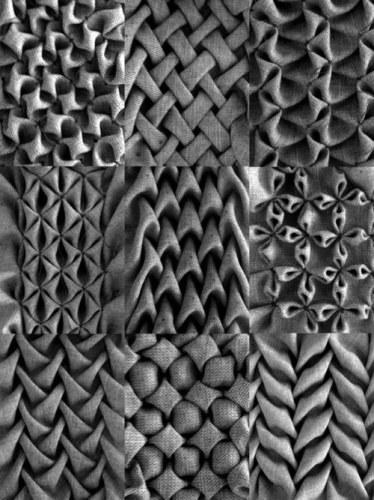
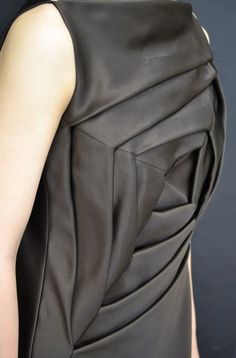
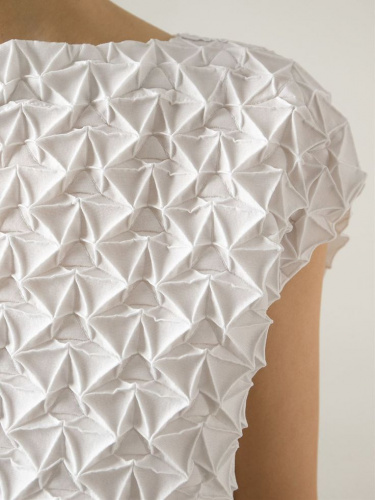
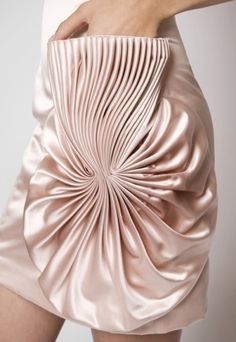
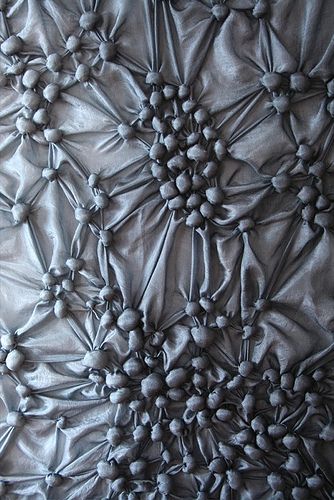






I'm not trying to take away from how neat those examples (and useful for concealing electronics) of smocking are, but I'm not sure the term "fabric origami" really fits.There is already a use for the term "fabric origami": http://www.origami-resource-center.com/fabric-folding.html
Maybe "fabric tessellations" would fit better and still embrace the nerdy feel. Hmm... I did a google search on "fabric tessellations" and found this article comparing origami tessellations to smocking tessellations, from the same site as above: http://www.origami-resource-center.com/origami-and-smocking.html The techniques are completely different and the smocking stitch patterns are quite different from the origami fold patterns.
But all that said, excellent idea combining smocking and e-textiles, especially using the space between the pleats as pixels. I can see that sound-activated one being very popular at raves. :-D
Yeah, I didn't really know what to call them, and some of the patterns were in the fabric section of an origami book I have, so that's why it is in quotations. I feel like it is kind of a buzzword right now that doesn't have a good definition, so yeah whatever you want to call them is good, I like tessellations as well. ^_^
Wow. This is an exact copy of what I do in my quilt work, including combining both the e-textile and heirloom sewing/smocking work. I'm a little shocked actually.
The first and third design remind me of a Danish Christmas tradition which may give you some inspiration. Christmas Hearts, as seen here: http://d200fahol9mbkt.cloudfront.net/item/470982/Christmas_Hearts1.jpg
For anyone looking for another LilyPad XBee communicator project, Kate Hartman has a great tutorial on making DIY SuperHero Communicator Cuffs out of felt - http://research.ocadu.ca/socialbody/project/diy-superhero-communicator-cuffs